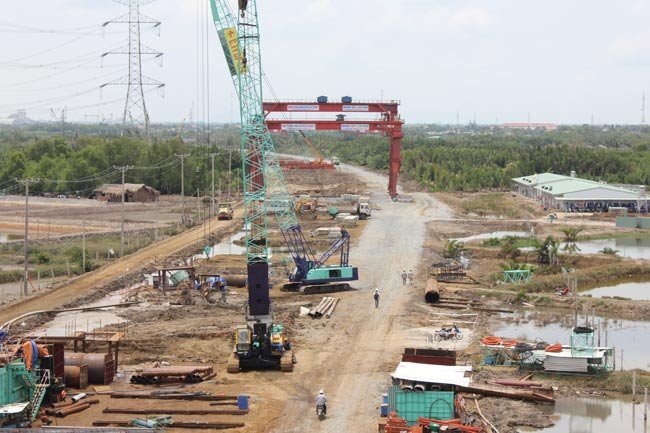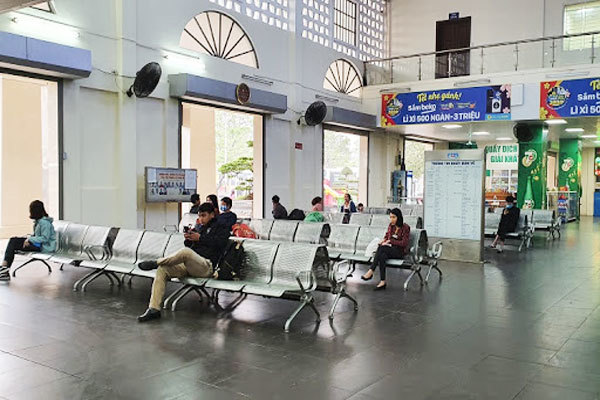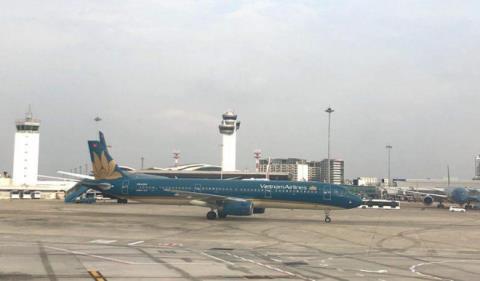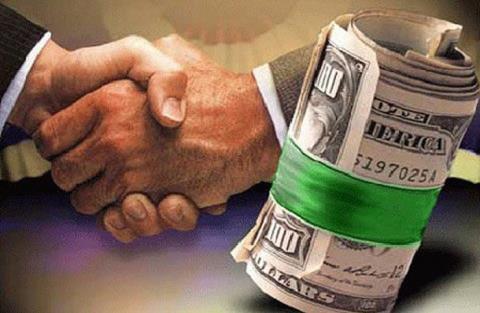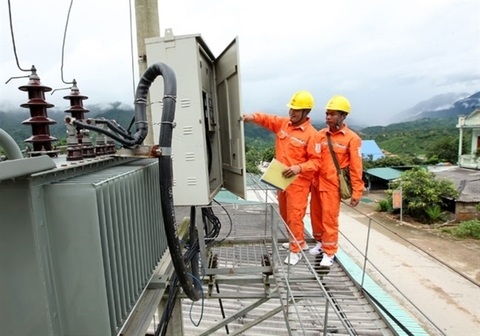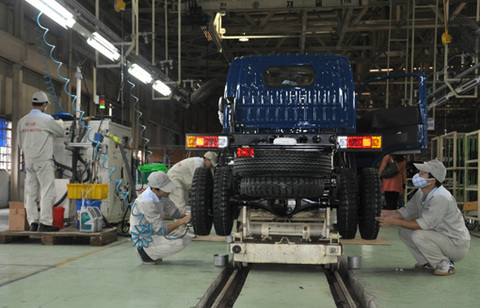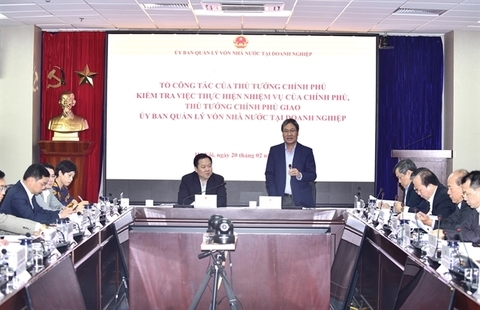- © Copyright of Vietnamnet Global.
- Tel: 024 3772 7988 Fax: (024) 37722734
- Email: [email protected]
SOEs
Update news SOEs
Equitising State-owned enterprises to boost growth amid COVID-19
 Dr Burkhard Schrage, Senior Programme Manager of Management at RMIT’s School of Business & Management talked about the work of equitising State-owned enterprises during the COVID-19 pandemic.
Dr Burkhard Schrage, Senior Programme Manager of Management at RMIT’s School of Business & Management talked about the work of equitising State-owned enterprises during the COVID-19 pandemic.
Vietnamese private enterprises increase investments abroad
 While private enterprises have made more outward investments, state-owned enterprises (SOEs) have been gradually reducing their investments, reported Bizlive.
While private enterprises have made more outward investments, state-owned enterprises (SOEs) have been gradually reducing their investments, reported Bizlive.
How are SOEs’ outward investment projects performing?
 State-owned economic groups had registered 114 outward investment projects as of the end of 2019 with registered capital of $13.8 billion, according to the MInistry of Public Investment.
State-owned economic groups had registered 114 outward investment projects as of the end of 2019 with registered capital of $13.8 billion, according to the MInistry of Public Investment.
Wide impacts to be made with new law changes
Effective in 2021, the amended laws on Enterprises, Investment, and Public-Private Partnership are expected to entail breakthrough changes to Vietnam’s business and investment landscape in the coming time,
Vietnam's revised enterprise law to not include household businesses
The National Assembly (NA) passed the revised Law on Enterprises on Wednesday morning in Ha Noi, introducing several important changes to regulations overseeing business activities.
Major infrastructure projects move at slow pace
 Major infrastructure projects, especially in the southern key economic zone, are moving at a snail’s pace due mainly to slow site clearance and capital disbursement, according to a report the Government recently sent to the National Assembly.
Major infrastructure projects, especially in the southern key economic zone, are moving at a snail’s pace due mainly to slow site clearance and capital disbursement, according to a report the Government recently sent to the National Assembly.
State-owned economic groups told to stop complaining
 State-owned economic groups, complaining about the losses caused by Covid-19, have asked for financial support at a time when the government is preoccupied with fighting the pandemic.
State-owned economic groups, complaining about the losses caused by Covid-19, have asked for financial support at a time when the government is preoccupied with fighting the pandemic.
Conflicting policies, land issues and virus hinder SOE equitisation
 The equitisation of State-owned enterprises (SOEs) was being hindered by troublesome policies, lack of transparency in land management and the recent devastation inflicted by the COVID-19 pandemic, experts said.
The equitisation of State-owned enterprises (SOEs) was being hindered by troublesome policies, lack of transparency in land management and the recent devastation inflicted by the COVID-19 pandemic, experts said.
Businesses report big losses, but pharmacies, food companies see profits
 The Q1 finance reports released by enterprises in nearly all business fields, from manufacturing and real estate to aviation and oil and gas, show big losses. Large enterprises have reported huge losses of trillions of dong.
The Q1 finance reports released by enterprises in nearly all business fields, from manufacturing and real estate to aviation and oil and gas, show big losses. Large enterprises have reported huge losses of trillions of dong.
Transport mainstays in call for policy backing
 State-owned transport giants Airports Corporation of Vietnam, Vietnam Airlines, Vietnam Railways, and Vietnam Maritime Corporation suffered all-time biggest losses in the first quarter of 2020 due to COVID-19
State-owned transport giants Airports Corporation of Vietnam, Vietnam Airlines, Vietnam Railways, and Vietnam Maritime Corporation suffered all-time biggest losses in the first quarter of 2020 due to COVID-19
Some SOEs seek to restore state governing policy
 Many state-owned corporations (SOEs) have asked to be put under the management of ministries as they were in the past. The proposal has been described by VCCI chair Vu Tien Loc as a "step back in the reform process".
Many state-owned corporations (SOEs) have asked to be put under the management of ministries as they were in the past. The proposal has been described by VCCI chair Vu Tien Loc as a "step back in the reform process".
Ministry addresses land issues to boost SOEs’ equitisation
 As issues related to land use rights still hinder State-owned enterprises (SOEs) from executing equitisation on time, the finance ministry has built a draft to amend the current decree regulating land issues.
As issues related to land use rights still hinder State-owned enterprises (SOEs) from executing equitisation on time, the finance ministry has built a draft to amend the current decree regulating land issues.
State-owned groups, general corporations report big losses due to Covid-19
 Enterprises in the transport sector have suffered the most from the epidemic.
Enterprises in the transport sector have suffered the most from the epidemic.
SOE managers can receive up to VND70 million in basic wages
 The policy under which enterprises’ managers are paid based on the enterprises’ scale and numbers of workers is unreasonable, according to experts.
The policy under which enterprises’ managers are paid based on the enterprises’ scale and numbers of workers is unreasonable, according to experts.
How many ‘crony’ businesses exist?
 A VCCI (Vietnam Chamber of Commerce and Industry) report released in late 2019 showed that the privileges to ‘crony’ businesses have decreased, but not enough to ensure equal competition among businesses.
A VCCI (Vietnam Chamber of Commerce and Industry) report released in late 2019 showed that the privileges to ‘crony’ businesses have decreased, but not enough to ensure equal competition among businesses.
Equitisation vital for VN stock market growth
 The successful equitisation and capital divestment of State-owned enterprises (SOEs) would create benefits that boosted the stock market and business performance, experts have said.
The successful equitisation and capital divestment of State-owned enterprises (SOEs) would create benefits that boosted the stock market and business performance, experts have said.
Ministries ask for permission to change SOE divestment plans
 Ministries are working to convince Prime Minister Nguyen Xuan Phuc to amend divestment plans at some large State-owned enterprises (SOEs).
Ministries are working to convince Prime Minister Nguyen Xuan Phuc to amend divestment plans at some large State-owned enterprises (SOEs).
VN to develop large-scale SOEs
 The Government has asked the Ministry of Planning and Investment to build a project on developing large-scale State-owned enterprises (SOEs) to promote their role in the country’s socio-economic development.
The Government has asked the Ministry of Planning and Investment to build a project on developing large-scale State-owned enterprises (SOEs) to promote their role in the country’s socio-economic development.
Ministries ask for permission to change SOE divestment plans
 Ministries are working to convince Prime Minister Nguyen Xuan Phuc to amend divestment plans at some large State-owned enterprises (SOEs).
Ministries are working to convince Prime Minister Nguyen Xuan Phuc to amend divestment plans at some large State-owned enterprises (SOEs).
Super committee faces difficulties in checking SOE property
 The increasing amount of property and land under State-owned enterprises (SOEs) was mentioned as a factor in their slow equitisation.
The increasing amount of property and land under State-owned enterprises (SOEs) was mentioned as a factor in their slow equitisation.





